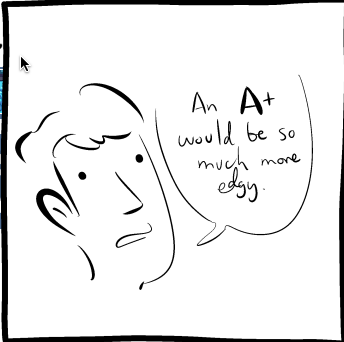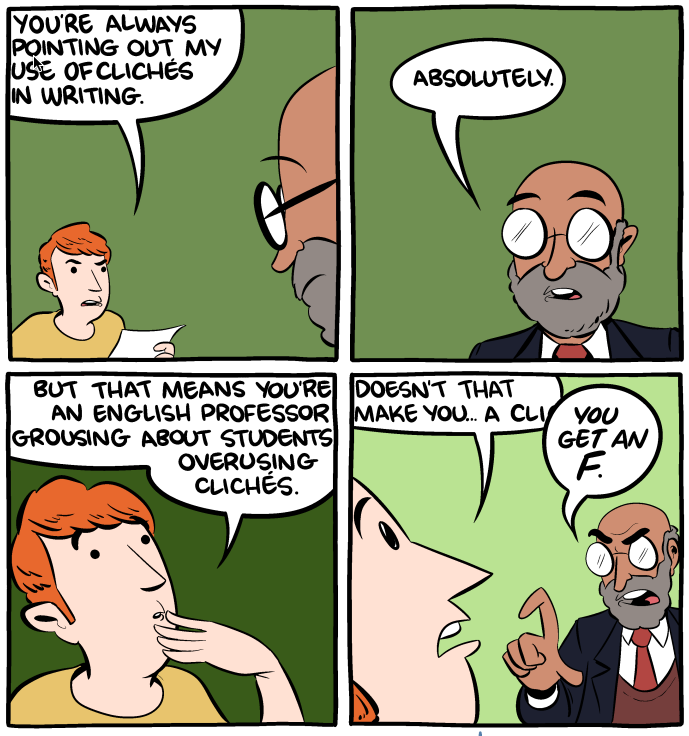Recursive epitomology
« previous post | next post »
Today's SMBC:
Mouseover title: "Life rule: Never do anything you've done more than 3 times already."
On the contrary, it seems to me. Beyond the status of a mere generic cliché, we can all aspire to become the type specimen of something important: the archtype or personification of a significant class of complaints.
Consider this passage from John McIntyre's fine post "Grammatical Malpractice", The Baltimore Sun 6/4/2016:
It had been a trying night at the paragraph factory, and the water for coffee had not yet come to a boil this morning when I spotted a billet-doux posted by Ian Loveless:
“I'd like to see this piece of worthless advice get a wider audience,” he wrote, citing this:
“To identify passive voice, just do a find or search for the passive verbs: is, was, are, has, had, would. Then see how you can get rid of that passive verb and replace it with a verb that has more energy and specificity.”
“Great Fowler’s ghost!” I muttered. This goes beyond the usual crackpot advice on usage that abounds online. This is more than crazy Nevile Gwynne fulminating about split infinitives. (Because Latin.) This goes beyond Grammarly’s applying fresh lipstick to the rotting corpse of the nauseous/nauseated distinction. This is malfeasance. This is Laetrile offered to cancer patients.
The writer appears ignorant of fundamental grammar. Forms of to be standing alone are not passives but copulatives. (None of your smut, now.) This article is arrant nonsense. Article (subject) is (copula) nonsense (subjective complement). Not passive at all. Has and had often function as auxiliaries. I have never seen such arrant nonsense. I (subject) have seen (verb) nonsense (object)—pure active-voice transitive construction. Would and could are modal auxiliaries. I could go full Pullum on this fool is not passive.
Geoff Pullum wrote to me, with a copy to John:
What is John McIntyre talking about in "Grammatical malpractice" when he uses as an example the sentence "I could go full Pullum on this fool"?
Just because I may have occasionally (and reluctantly) mentioned that Strunk and White were a pair of shameless, pontificating, ignorant, hypocritical, incompetent, authoritarian old weasels, or hinted that for the issuers of some online grammar advice the medieval punishment of being hung up in a cage for crows to eat should not be too hastily ruled out, is my name now to be taken as a byword for polemical critique? Am I to be adopted as some kind of icon of irascibility? I just do not understand where this McIntyre fellow gets his inaccurate impressions of me. I am not of unstable temperament.
I have not hurled a misguided usage advice merchant out of a barroom and into the street for… well, if you ignore last night (that twerp deserved it), perhaps two weeks or more. I wish people wouldn't say these things about me. Could we get the Language Log Plaza legal team to look into the possibilities of a defamation suit?
John's answer: "Bring it on."
To which Geoff responded:
Typical. Who are the only people I have heard use that phrase who weren't in a movie at the time? You, and George W. Bush. That's not good company.
When John and Geoff bring these exchanges into public view, they'll be well on the way to establishing an edgy new genre of academic outreach: intellectual kayfabe. Of course this approach can trace its history back to Plato and beyond, but even the Socratic dialogues were deficient in references to brawling and having one's opponents eaten by crows.
Donald Trump is not the first person to show us that the ethos of professional wrestling has a certain appeal in politics. And the intellectual substrate for linguistic cage matches has been in place for a long time.
Vita brevis, rixa longa.
And yes, I know that epitomology wasn't a word. Until now.
Also, the SMBC aftercomic:


bks said,
June 12, 2016 @ 9:05 am
…overusing cliches..? F-
[(myl) Bakhtinian heteroglossia: A+]
Aristotle Pagaltzis said,
June 12, 2016 @ 10:27 am
Personally I like to think of Mr. Pullum as the Lewis Black of linguistics… ;-)
empty said,
June 12, 2016 @ 11:13 am
I like to think of Pullum and McIntyre as the Nigel Tufnel and David St. Hubbins of anti-peevery injective: fire and ice, if you will.
"'I could go full Pullum on this fool' is not passive" is one of my favorite sentences in the language, and I'm glad that you're bringing it to the attention of a wider audience.
Noscitur a sociis said,
June 12, 2016 @ 1:28 pm
The original appears to be https://ahrefs.com/blog/writing-tips/ . Other "grammar mistakes" to avoid include singular they, less vs. fewer, and an explanation of "dangling modifiers" that I still don't understand.
Michael Watts said,
June 12, 2016 @ 2:56 pm
This is hopelessly off topic, but I'd really like to know what's going on here: http://mimesislaw.com/fault-lines/thats-so-nypd-just-give-the-cop-your-motherfuckng-phone/10247
Check that URL — the missing i is not a mistake. The title of the piece is "That’s So NYPD: Just Give the Cop Your Motherfuck*ng Phone". They seem to think that "fuck" is a perfectly acceptable word to use in a headline, but "fucking" is a bridge too far?
Mr Punch said,
June 12, 2016 @ 3:05 pm
That "worthless advice" sounds like a derivative of Korzybski's General Semantics.
Sili said,
June 12, 2016 @ 3:18 pm
Is it true that 'cliche' is the sound stereotypes make? Or has Stephen Fry lied to me again.
By now I wouldn't mind terribly if more arguments and political contests were decided by flyting (*checks for misnegation*).
[(myl) Pretty much — see "Clichés, stereotypes, and other obsolete metaphors", 3/15/2004.]
Viseguy said,
June 12, 2016 @ 3:53 pm
"Go full Pullum" kicks assonance.
Rubrick said,
June 12, 2016 @ 4:22 pm
Never go full Pullum! Everybody knows that!.
Ray said,
June 12, 2016 @ 5:03 pm
@Michael Watts –
I think they left out the asterisk (*) in the url because urls don't understand asterisks (except in query strings, for example)
meanwhile, does anybody have a good explanation of the origin of the word "kayfabe"?
Michael Watts said,
June 12, 2016 @ 5:09 pm
Ray, I get that. But I never really thought the -ing was what made "motherfucking" offensive — usually in an obfuscated curse, the obfuscation would cover some part of the curse.
Brett said,
June 12, 2016 @ 7:17 pm
@Ray: "Kayfabe" goes back to carnie slang. My understanding is that the best guess as to its origin was that it started out as a Pig-Latin-like modification of "be fake" and was used as a reminder to be in character in front of an audience.
bratschegirl said,
June 12, 2016 @ 7:25 pm
I followed the link kindly provided by @Noscitur a sociis. If Ms. Tener didn't find "She teaches on the faculty of Harvard Medical School’s publishing course," seen in her own bio on this page, to be awkward and in need of revision, I'm not letting her near anything I write.
Ray said,
June 12, 2016 @ 10:01 pm
@Michael Watts
haha maybe the writer's trying to stay in character? in a kayfabe going-thru-the-motions kinda way?
Graeme said,
June 12, 2016 @ 11:44 pm
Hat's off* to the cartoonist for finding a fresh way to highlight a couple of university stereotypes.
* retired cliché. Who wears hats let alone doffs them these days?
shg said,
June 13, 2016 @ 9:45 am
@Michael Watts: It's a commentary on the infantile refusal to spell out the word "fuck," as if by replacing a letter with an asterisk because we're too sensitive to bear the sight of a common word, it somehow makes it less vulgar.
The joke is that "fuck" is there in full, while the "i" is replaced with an asterisk. Some people understand the message. Some do not. That can't be helped.
ardj said,
June 16, 2016 @ 9:53 am
Re Lisa Tener’s writing tips (https://ahrefs.com/blog/writing-tips/)
I think that this piece is generally not very well-written, which may have led to some misunderstanding.
a) active verbs: When Ms Tener speaks (Tip 2) of ‘active’ and ‘passive’ verbs, she does not use the words in the ordinary sense of grammatical definition – even though she deals with them in a blog headed “Grammar Mistakes” and just after a section headed “Grammar Tools for Bloggers”. What she is trying to do is to persuade people to avoid verbs with little semantic zest or colour, and instead to use verbs which have more dramatic imagery or force (or, as she writes, “energy and specificity”). Her example contrasts the verb "to be" (and by extension ‘have’ and ‘would’) with verbs such as ‘offer’, ‘awaken’, ‘add’, ‘view’, hope’, ‘experience’. In other words, a child’s or adman’s guide to writing language which will take readers by the scruff of the neck and drag them through an “experience”, or at least sell them some soap powder. It is not a wholly unworthy aim, but she does not do it very well; and using ‘active’/’passive’ is likely to confuse a good many people when combined with her chosen heading. In fairness to her, this does not come in the ‘grammar mistakes” section but in the “Writing Tips” section.
b) @Noscity a sociis and Dangling modifiers. I have no difficulty with her explanation of what she means by this, even if one is inclined to suspect that she was frightened as a child by a dangling participle. Her example sentence is “Being a blogger, the best post she ever wrote was for Ahrefs.: about which she says that ‘Being a blogger’ is rather far away from ‘she’, and one might tend to try to apply it to ‘the best post’. One could think of better examples, but she has a small point. As to singular “they” and less/fewer, I can think of no defence for her.
William Locke said,
June 18, 2016 @ 6:51 pm
I'm rather late to the party, but I have a question re: Geoff Pollum's "Fear and Loathing of the English Passive," which I have started reading from the link provided in John McIntyre's article.
Would "be prepared" function as an adjectival passive?
I could see two cases, one in which "be prepared" absolutely would qualify as passive, and one in which I'm not so sure. The former would be in a sentence such as:
1) The meal was prepared (by a professional chef).
However, what about the following sentence:
2) He was prepared (for their camping trip).
It is similar to an example in Pollum's article, "The door was locked," but I'm just not sure I'm reading it right.